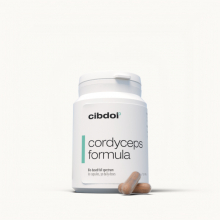Should cordyceps be taken on an empty stomach or with food?
Last updated:
Published:
Did you know that cordyceps, a type of parasitic fungus, includes over 400 different mushroom species used in medicine, including blood-related treatments? This might come as a shock, but it's true. Cordyceps sinensis, a fungus species known as a mushroom in common terms, has carved its place in the realm of fungi and medicine due to its numerous potential benefits. But here's the catch - the health benefits and food interactions of its effectiveness largely depend on how you consume it, with certain risks involved.
Contents:
Some studies suggest that taking the fungus cordyceps, a type of mushroom, on an empty stomach yields the best results in terms of fungi absorption. However, there's more to this story about people, body, blood, and studies than meets the eye. Consuming cordyceps, a type of mushroom, correctly can unlock a treasure trove of benefits for your health and wellbeing. Studies suggest it may positively impact your blood and immune system. On the flip side, improper use of cordyceps sinensis, specifically cordyceps mushrooms, could lead to less-than-optimal results, as studies suggest.
Before you dive headfirst into your new mushroom supplement supply, let's debunk some common misconceptions about taking cordyceps. Studies can help you make an informed decision.

Optimal Timing for Cordyceps Intake
Ideal Time to Consume Cordyceps
The question, "should the mushroom cordyceps, et al be taken on an empty stomach or with food?" is quite common. The intake of cordyceps, a type of mushroom, can vary based on individual lifestyle and personal preference. Some folks, et al, swear by taking cordyceps sinensis or cordyceps mushrooms first thing in the morning, while others prefer to consume cordyceps militaris later in the day.
-
Morning intake: Kick start your day with a dose of cordyceps, a beneficial mushroom, et al. The cordyceps mushroom benefits can help boost your energy levels and improve focus throughout the day, et al.
-
Afternoon intake: If you're hitting that mid-day slump, cordyceps, as suggested by et al, can provide a much-needed pick-me-up.
Impact of Timing on Effectiveness
The timing of cordyceps intake could potentially impact its effectiveness. For instance, consuming cordyceps mushroom before a workout may enhance physical performance due to its known energy-boosting properties.
-
Pre-workout: Take cordyceps about 30 minutes before exercise for an energy boost.
-
Post-workout: Consuming it post-exercise might aid recovery.
However, more research is needed to fully understand how timing affects the benefits of the cordyceps mushroom supplement.
Influence of Individual's Lifestyle on Intake Timing
Your lifestyle plays a significant role in determining when you should consume cordyceps:
-
Early risers might benefit from morning intake.
-
Night owls could find an afternoon dose more beneficial.
-
Fitness enthusiasts may want to align their cordyceps mushroom consumption with their workout schedule.
Remember, cordyceps might work best for one person but not as well for another. It's all about finding what, like cordyceps, fits into your routine and lifestyle!
Correlation Between Timing and Potential Side Effects
While side effects from cordyceps are rare, they can occur if you take too much or take it at the wrong time.
-
Taking cordyceps late at night could lead to insomnia due to its energizing effects.
-
Cordyceps consumption on an empty stomach might cause mild digestive upset in some individuals.
How to Take Cordyceps: Dosage and Combinations
Let's dive right in. The recommended dosage of cordyceps varies depending on age and health conditions. For kids aged 12-18, experts suggest a daily dose of 1-3 grams of cordyceps. Adults can take up to 3-6 grams daily. However, if you're dealing with specific health issues like fatigue or respiratory problems, it might be best to bump up the dosage of cordyceps to around 6-9 grams per day.
Now, here's a fun fact for ya! Combining cordyceps with certain foods can amplify its benefits. Foods high in vitamin C like oranges, bell peppers, and strawberries are great options because they enhance the absorption of cordyceps. You could also pair cordyceps with protein-rich foods such as lean meat or beans for an energy boost.
But hold your horses! Don't get too carried away with these magical mushrooms. Overconsumption of cordyceps may lead to mild side effects like diarrhea or dry mouth. On the flip side, underconsumption won't give you much benefit either.
Here's another nugget of wisdom - cordyceps can work wonders when combined with other supplements or medications. For instance:
-
Pairing it with ginseng enhances energy levels.
-
Combining it with echinacea boosts immune function.
-
Taking it alongside rhodiola helps combat stress.
However, remember that everyone is unique and reacts differently to various combinations, including cordyceps. So always consult your healthcare provider before trying new supplement combos, such as cordyceps.
Risks Associated with Cordyceps Consumption
Cordyceps mushrooms, specifically cordyceps spp and cordyceps militaris, are a hot topic in the health world. But is there any risk involved? Let's cut to the chase.
The Side Effects
Firstly, it's worth noting that side effects from consuming cordyceps, these fungi, do exist. Some folks have reported mild discomfort like nausea or diarrhea after taking cordyceps. Others have experienced dry mouth or even an increase in anxiety levels after consuming cordyceps.
-
Nausea
-
Diarrhea
-
Dry Mouth
-
Increased Anxiety
These side effects aren't typically severe but they're still something to keep an eye on if you're thinking about adding cordyceps into your diet.
Pre-existing Conditions
Secondly, if you've got pre-existing conditions like autoimmune diseases or bleeding disorders, tread carefully with cordyceps. There's potential for cordyceps to make these conditions worse by stimulating the immune system and slowing blood clotting.
-
Autoimmune Diseases
-
Bleeding Disorders
So if you've got something like lupus or hemophilia, definitely chat with your healthcare provider before starting on cordyceps.
Drug Interactions
Thirdly, interactions can occur between cordyceps and other drugs or substances. For instance, taking cordyceps alongside immunosuppressant drugs could potentially reduce their effectiveness due to the immune-stimulating properties of this fungus.
| Substance | Potential Interaction |
|---|---|
| Immunosuppressants | Reduced Effectiveness |
This isn't a comprehensive list of cordyceps by any means so again, it's crucial to consult with a healthcare professional before diving in.
Consultation is Key
Lastly but certainly not least - always consult your healthcare provider before starting consumption of anything new like cordyceps. Safety first! Cordyceps can provide guidance based on your specific health condition and medication regimen.
To wrap it up - while cordyceps mushrooms can offer some interesting health benefits, they're not without risk. It's important to be aware of potential side effects and interactions of cordyceps, and how they might affect pre-existing conditions before deciding whether or not they're right for you.
Should cordyceps be taken on an empty stomach or with food?
So, you've been wondering about the best way to take cordyceps? Well, there's no one-size-fits-all answer. Your body and lifestyle play a huge role in determining what works for you, including cordyceps. But don't sweat it! Just remember to follow the recommended dosage of cordyceps and listen to your body's response. If you're not sure about cordyceps, consult with a healthcare professional who knows your health history.
Now that we've got that sorted out, why not give cordyceps a shot? It might just be the wellness boost you need. As always, stay informed about cordyceps and make health decisions that suit your individual needs.
FAQs
Can I take cordyceps if I have an existing medical condition?
If you have an existing medical condition, it is advisable to consult your healthcare provider before starting any new supplement regimen, including cordyceps.
Is there a risk of side effects from taking cordyceps?
While generally considered safe for most people, some may experience mild side effects such as diarrhea or dry mouth when consuming cordyceps.
Can I take cordyceps along with other supplements?
Yes, but it's always best to get advice from a healthcare professional before combining supplements like cordyceps.
How long does it take for cordyceps to start working?
The time cordyceps effects vary between individuals based on factors like age, overall health status and dosage taken.
Are all cordyceps supplements the same?
Nope! The quality can vary greatly among brands so do your homework before making a purchase.










